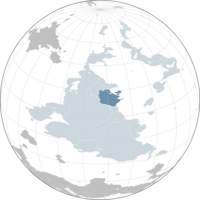Zyang
This article is incomplete because it is pending further input from participants, or it is a work-in-progress by one author. Please comment on this article's talk page to share your input, comments and questions. Note: To contribute to this article, you may need to seek help from the author(s) of this page. |
Kingdom of Zyang | |
|---|---|
|
Flag | |
| Motto: 我拉徛聯合 Romanized: Voe-ló gé loé yen-vol | |
| Anthem: 天下一旗 romanized: Ten hhà il hhoe "One flag under heaven" In other official languages | |
 | |
| Capital | Hhoegong |
| Official languages | Standard Yu |
| Recognised regional languages | Beihua, Shorgur, Syuba, Nomvai, Zhoushi |
| Demonym(s) | Zyangan |
| Government | Unitary parliamentary semi-democratic constitutional monarchy |
• Monarch | Von Poeyang |
• Prime Minister | Loe Moekoeng |
| Legislature | [placeholder] |
| Area | |
• | 1,075,411 km2 (415,219 sq mi) |
| Population | |
• 2021 estimate | 64,571,333 |
• Density | 60.04/km2 (155.5/sq mi) |
| GDP (PPP) | estimate |
• Total | 1.6 trillion UFM |
• Per capita | 24,397 UFM |
| Gini | 33 medium |
| HDI | 0.737 high |
| Currency | Zyang Co (鈔) (ZCO) |
| Calling code | +18 |
| ISO 3166 code | SR |
| Internet TLD | .zy |
The Kingdom of Zyang (Standard Yu: 潒國; romanized: Zyang-Gú; [ʑàŋk̬ʊ́]), commonly known as simply Zyang, is a country located on the eastern coast of the continent Atusia. With a population of 64 million, it spans 1,075,411 square kilomiters (415,219 sq mi). Zyang is bordered to the north by Shorguria and Syuba, by Zhousheng to the south, [Placeholder] to the west, and the Zyang Sea to the west. Hhoegong is the capital and alrgest city, followed by Hhoejiu and Zavun.
Sinitic peoples have lived in the region of today's Zyang for millennia. Various states have ruled in the area such as the Soel, Han and San kingdoms, which rivalled with each other as well as the foreign turkic states to the north and west, and the tibetic and zhoushi peoples to the south. The state of Zyang originated around the Zyang river and dominated in the northern regions of the modern day country until the 14th century when it expanded southwards defeating the powerful San Kingdom and the Zhengian states. The Kingdom of Zyang became a regional powerhouse in trade, having trade routes as far as Kaliban, Salmuria and Hong Bang which was originally a colony of Zyang. A decline in it's powerhouse status occured in the early 19th century when, after the [Placeholder] war, Zhousheng was lost to Suidenland. This decline also saw the independance of Hong Bang and release of Syuba and Kasai from their cliant state status.
The Kingdom of Zyang is a great power in regional and global affairs and a founding member of [Placeholder], and ranks high in the Human Development Index. It has the second-largest economy in eastern Atusia. Zyang is classified as a newly industrialised economy, with manufacturing, agriculture, and tourism as leading sectors.
Etymology
The name of the kingdom comes from the original state of Zyang in the 14th century, which originaly followed the common naming conventions where the states were named after the dynasty ruling them, but due to an era of civil war where seven diferent dynasties rule for various amounts of time in the span of 20 years, started being reffered to by the name of the large Zyang river around which the state was based upon.
The name of the river is thought to come from the fact that elephants, which are symbols of royalty and power, were found in the basin of the river, as the character for Zyang 潒 (Zyáng) contains the character 象 (zyáng, 'elephant') which are both pronounced the same way in the Yu language.
The country was known to the west as Jan, Zang or Shang due to the different ways merchants who didnt speak any Yu language pronounced them, the latter name was most likely influenced by the Beihua reading of the character 潒 (Xiàng).
